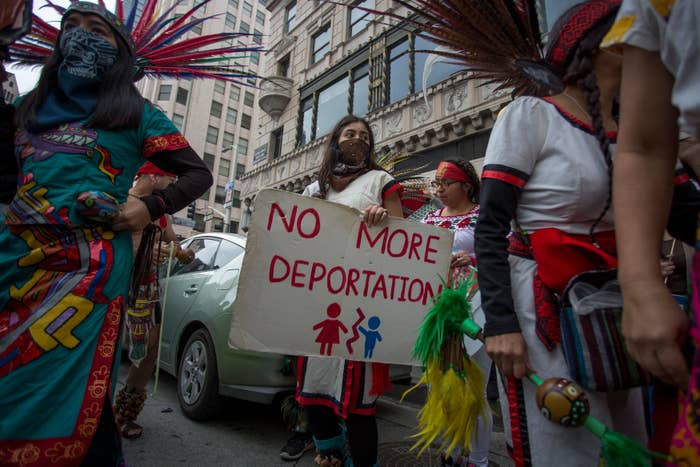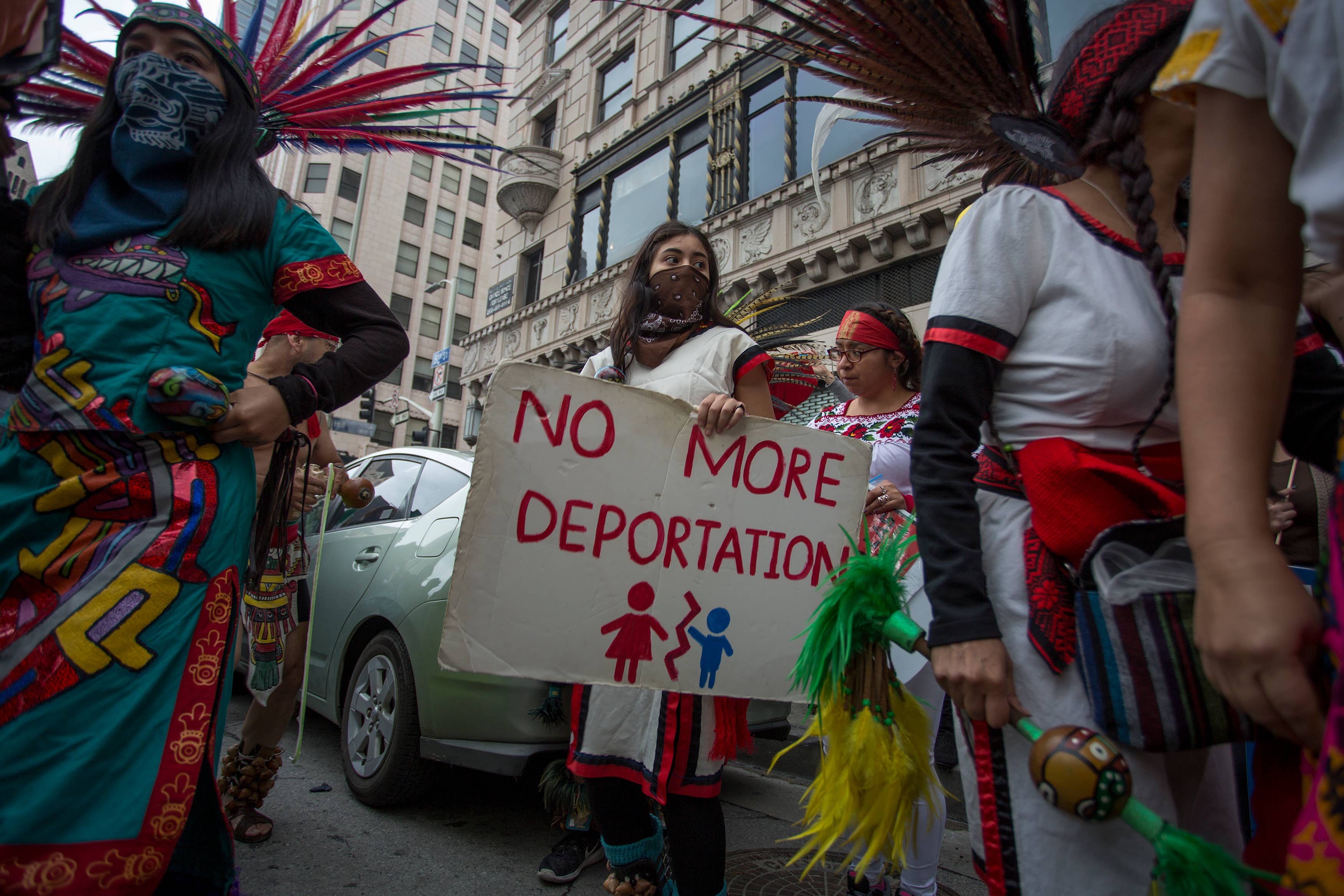
While the Obama administration faced its share of criticism for what some called unlawful crackdowns on undocumented immigrants, U.S. Immigration and Customs Enforcement (ICE) raids under President Donald Trump ratcheted up existing procedures and have undermined programs Barack Obama put in place to prevent the deportation of individuals who don't pose a threat. Supporters of Trump—and even Trump himself—have heralded the hundreds of arrests made since he took office, saying the billionaire is merely making good on promises he made on the campaign trail. Trump claims that the raids have resulted in the deportation of “gang members, drug dealers, and others,” but a closer examination of individuals being detained by ICE—and the manner in which they are being arrested—would indicate otherwise.
Who is being arrested?
The second week of February saw nearly 700 arrests in raids conducted by ICE officials. Trump and his constituents have repeatedly made claims that the arrests specifically target criminals—or as Trump infamously dubbed them during his presidential campaign, “bad hombres.” But recently leaked memos of the Trump administration’s intentions revealed that hundreds of thousands of people could face deportation—even those who had previously been protected under the Obama administration.
“One memo instructs ICE agents to ignore Obama’s memos on immigration priorities that targeted only recent arrivals and convicted criminal migrants for deportation,” reportedReuters. “Instead, migrants who have been charged with crimes but not convicted would be prioritized for deportation. The guidance also allows ICE agents wide discretion in deciding who to deport and considers anyone in the United States illegally to be subject to deportation.”
Perhaps most unsettling is the uncertainty of the future of the Deferred Action for Childhood Arrivals (DACA), which was instituted through an executive order from the Obama administration to protect undocumented immigrants who were brought to the United States as children. Sometimes referred to as DREAMers—a reference to the Development, Relief, and Education for Alien Minors (DREAM) Act—these individuals are protected from deportation with conditional residency upon approval of their applications (provided they meet further requirements). According to CNN, more than 750,000 people are currently enrolled in the program and more than 46,000 others are currently awaiting approval of pending applications. During a February press conference, Trump said DACA was a “very difficult subject for me” and did not specify how his administration would handle the program or the fate of those who could face deportation if it were to be quashed.
At least one known DREAMer has already been arrested. Seattle-area resident and DACA recipient Daniel Ramirez Medina, 23, was taken into custody in early February and has remained detained despite having no evidence of a criminal record. Ramirez was brought to the United States at the age of 7 and is now the father of a 3-year-old son, who is a U.S. citizen. ICE has reportedly detained Ramirez on the grounds of alleged self-described gang affiliation, but Ramirez’s lawyers claim he "unequivocally denies" being in a gang and was pressed by immigration officials to falsely identify as a gang affiliate.
Guadalupe García de Rayos, 35, is another example of questionable ICE raids resulting in arrest. Rayos, a married mother of two children born in the United States, was arrested in Phoenix on Feb. 8 after a routine check-in with immigration officials. Eight years ago, Rayos was arrested and detained for months for using a fake Social Security Number and was ordered to be deported to Mexico. But after appealing her conviction, she was granted the right to remain in the United States on the condition that she checked in with immigration officials intermittently. During this year’s check-in, she was detained and deported within 24 hours. Her children and family remain in the United States.
How are they being arrested?
The arrests of Rayos and Ramirez signal a shift in how and on what grounds immigration raids are being conducted. Ramirez was reportedly taken into custody during a raid that specifically targeted his father, for whom ICE agents reportedly had an arrest warrant. According to CNN, court papers filed by Ramirez’s lawyer claim that he was present at his father’s home during the raid and was questioned by immigration officials, who asked whether he was in the state illegally. Despite having a work permit and perhaps misunderstanding the question, Ramirez responded that he was. He then reportedly declined to answer further questions per the advisement of his brother, CNN reports. Upon being taken to the processing center and clarifying that he did in fact have a work permit, Ramirez was reportedly told by ICE officials, "It doesn't matter, because you weren't born in this country.”
Recent memos released by the Department of Homeland Security indicate that radical shifts in the handling of undocumented immigrants are imminent. Among the more immediate changes, the memos called for the hiring of an additional 5,000 Border Patrol agents and 10,000 ICE officials, according to BuzzFeed News. A previous “catch-and-release” policy—meaning undocumented immigrants would be granted parole while they awaited court proceedings—will end (perhaps best illustrated by Ramirez’s detention in spite of a lack of verifiable wrongdoing).
“The memo states detention during this time is preferred, potentially resulting in a large increase in the number of people detained at facilities around the country,” reports BuzzFeed News. And make no mistake, private prisons nationwide are directly profiting from ICE raids. According to the Center for American Progress, 73 percent of immigrants in detention in 2016 were housed in facilities run by private prison companies, and that figure will likely grow as immigration officials opt to detain undocumented immigrants.
“These memos confirm that the Trump administration is willing to trample on due process, human decency, the well-being of our communities, and even protections for vulnerable children, in pursuit of a hyper-aggressive mass deportation policy,” Omar Jadwat, director of the American Civil Liberties Union’s Immigrants’ Rights Project, said in a statement. “However, President Trump does not have the last word here—the courts and the public will not allow this un-American dream to become reality.”
Motives for ICE raids have reportedly included infractions as minor as traffic violations, according to the Washington Post. More troubling, however, are stakeouts and random searches that lead to arrests of undocumented immigrants. ICE agents have been reported to stake out in front of schools, shelters, and private residences, making many undocumented immigrants fearful of leaving their homes. Critics have also accused ICE of racially profiling during searches and arrests.
“The immediate threat to undocumented immigrants is contact with any law enforcement, including local police,” Sameer M. Ashar, a Clinical Professor at the School of Law at the University of California, Irvine, told Complex in a statement. “Although a number of cities and counties are attempting to shield immigrants from ICE, information about arrests and other types of contact, such as gang affiliate designation, is passed up to federal authorities through increasingly automated data systems. Unless local authorities curb broken windows-style policing, those contacts, arrests, and designations will continue to occur and undocumented immigrants—who pose no danger but simply live in over-policed neighborhoods—will continue to be put under threat of deportation.”
Sara Beltran-Hernandez, 26, was critically ill and awaiting emergency surgery for a brain tumor when she was arrested on Feb. 22. She was forcibly removed from her hospital bed by federal agents and transferred to a detention center, according to the Los Angeles Times. Beltran-Hernandez was reportedly “bound by her hands and feet and removed by wheelchair from Huguley Hospital in Fort Worth late Wednesday by Immigration and Customs Enforcement agents.” She had reportedly fled domestic violence by her partner in El Salvador and was on her way to meet her family in Queens before she was arrested by border officials near Hidalgo, Texas, in November 2015. She had been detained at the Prairieland Detention Center in Alvarado, Texas, while her family petitioned for asylum before Wednesday’s arrest.
“Virtually every immigrant is now a priority for detention and deportation,” Joanne Lin, ACLU senior legislative counsel, said in a statement. “Immigration and border agents will increase dramatically in number and are empowered to operate unfettered. State and local law enforcement agencies, including those with records of racial profiling and police brutality, are encouraged to become immigration agents.”
Virtually every immigrant is now a priority for detention and deportation.
ICE arrests can be tricky, and the agency often abuses and misrepresents its authority, Ashar tells Complex. “For example, ICE calls its agents ‘police’ in interactions with the public when they are not actually police officers,” Ashar explains. “This confuses members of the public and this confusion is intentional on the part of the agency.” Ashar added that another example is ICE using non-judicial, administrative warrants to gain entry to homes and businesses, at which point they make “collateral arrests” like that of Ramirez during a raid specifically targeting his father. “ICE uses policing tactics without any of the procedural defenses, constraints, and oversight (as ineffectual as those may be in many circumstances) that apply in criminal law contexts,” he said.
What happens after arrest?
According to the Pew Research Center, there were 11.1 million undocumented immigrants living in the United States in 2014. The Obama administration deported 2.5 million people through immigration orders between 2009 and 2015 (more than any other president in American history). The Trump administration, however, has expanded the freedoms of ICE agents and seeks to bypass courts to deport as many undocumented immigrants as possible before giving them the chance to ever see a judge. In his post-election 60 Minutes interview, Trump said that with regard to his deportation plans, “people that are criminal and have criminal records—gang members, drug dealers, where a lot of these people, probably 2 million, it could be even 3 million—we are getting them out of our country or we are going to incarcerate.”
Rayos is one example of the starkest contrasts between what happened to undocumented immigrants with criminal convictions (and without, as many critics have pointed out) during the Obama era and now under the Trump administration. Rayos was able to remain in the United States with her children on the condition that she attend yearly and bi-yearly check-ins, an illustration of Obama’s “felons, not families” position on deportation. But not so in Trump’s America, where petty crimes and traffic violations can be reason enough for arrest and deportation.
New directives under Trump to enforce immigration laws more aggressively will allow for more deportations than previous administrations, regardless of whether those individuals pose a “threat” to the American people. The Trump administration’s memos revealed that it is considering a militarization proposal to mobilize 100,000 National Guard troops for immigration raids, which would reportedly target undocumented immigrants in cities like Portland and New Orleans, which are notably far from the southern and northern borders. “We’re getting gang members out, we’re getting drug lords out, we’re getting really bad dudes out of this country—and at a rate that nobody’s ever seen before,” Trump said in a recent White House policy discussion. “It’s a military operation.”
But make no mistake, undocumented immigrants have the right to due process. Ashar says they do have the right to refuse entry to law enforcement officials without a valid warrant, as well as the right to refuse questioning without a lawyer present. And perhaps most importantly, they “have the right to argue against deportation on various grounds in front of an immigration judge,” he said. The ACLU has doubled down its efforts to protect the rights of undocumented immigrants and DACA recipients. They are especially vocal about their support of Ramirez, whose arrest they said “could make a travesty of the federal government’s promises to DACA grantees across the country.” According to Jadwat, “Secretary Kelly and President Trump should immediately issue guidance confirming that the government stands by its promises to Dreamers and ensuring that ICE does not arrest, detain, or deport DACA grantees.” Trump has yet to announce a formal position on how his administration will handle DACA recipients.


